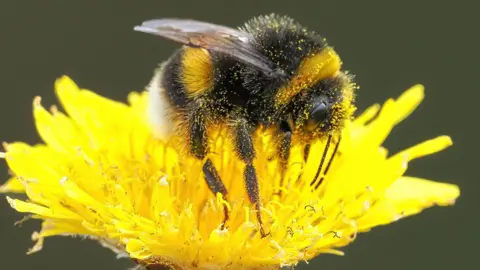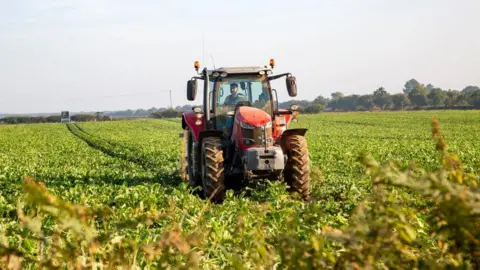 Getty Photographs/Gerwyn Davies/500px
Getty Photographs/Gerwyn Davies/500pxBased on information evaluated by two environmental charities, pesticides that hurt bees were found in the “majority” of English waterways examined within the last 12 months.
The Rivers Belief and Wildlife and Countryside Hyperlink discovered neonicotinoid pesticides had been current in 85% of English rivers examined by the Atmosphere Company between 2023 and 2024.
The banned pesticide was signed off for emergency use by the earlier authorities to fight an illness impacting sugar beet crops—a choice for which the Division for Atmosphere, Meals, and Rural Affairs (Defra) is now being investigated.
On Monday, the federal government promised “to ban using neonicotinoid pesticides that threaten bees and different essential pollinators.”
The Workplace for Environmental Safety is investigating Defra’s emergency authorization to use a neonicotinoid on sugar beet seeds in 2023 and 2024.
The watchdog is exploring whether the federal government did not adjust to environmental legal guidelines when it initially granted the use of the banned pesticide.
Neonicotinoids are a group of pesticides utilized in agriculture, horticulture, and veterinary medicine to regulate pests; however, they also hurt bees and other beneficial bugs.
They’re currently utilized by sugar beet farmers to guard their crops from virus yellows, an illness spread by aphids.
In March, Dan Inexperienced, the agriculture director for British Sugar, stated that the pesticide was wanted “to guard the UK sugar beet crop and farmer livelihoods.”. However, environmental charities are calling on the federal government to “implement and lengthen” the ban on using neonicotinoids to guard plant and animal well-being and for the company to perform higher river monitoring.
Dr. Richard Gill, a precept researcher at Imperial School, stated that excessive concentrations of neonicotinoids can kill bees; smaller portions may also have “cumulative, sub-lethal effects on pollinators, altering their behavior and impacting their genes.
Dr. Gill stated that under the effects of neonicotinoids, bees can wrestle to fly and “appear to carry again much less pollen” to their hives.
The most recent evaluation of Atmosphere Company figures comes against a backdrop of declining bee populations nationwide.
Several components—including modifications in using agricultural land, urbanisation, the influence of local weather change, pesticide use, and rising pathogens—mean many bee species are “not doing very nicely,” Dr. Gill stated.
“It’s concerning that we’re discovering these pesticides within the rivers,” Dr. Gill stated, adding that it was essential to monitor the concentration of chemical compounds in the waterways.
Amy Fairman of the River Motion marketing campaign group stated that agricultural waste is liable for a greater share of water and air pollution than sewage in the UK.
She stated that whereas their influence on bees is broadly recognized, neonicotinoids additionally harm marine ecosystems, including river bugs.
“River bugs are proper on the backside of the meal chain,” she instructed BBC Information. “If we’re destroying the underside of the meal chain in our rivers, that will have a knock-on impact.”
The chemical compounds are additionally “notably reasonably harmful to human well-being, Ms. Fairman stated.
She recommended that individuals contemplating swimming in polluted rivers “perceive the degrees of contamination” and “educate” themselves about the dangers before entering the water.
The most recent evaluation suggests a slight improvement in neonicotinoid ranges compared to earlier years.
The Rivers Belief and Wildlife and Countryside Hyperlink has identified its evaluation relies on a small pattern dimension of information offered by the Atmosphere Company.
The charities are calling for more thorough river monitoring by the regulator after only a small proportion of the nation’s river websites were examined for neonicotinoids within the last 12 months.
 Getty Photographs
Getty PhotographsOn Monday, a Defra spokesperson stated the division is “dedicated to tackling all sources of air pollution to wash up our rivers, lakes, and seas.
“This authority has been clear that we are going to change present insurance policies to ban using neonicotinoid pesticides that threaten bees and different essential pollinators.”
The Atmosphere Company stated its testing was “particularly focused at websites, the place we need to higher perceive the chemical danger and any motion wanted to guard the atmosphere.”
………………………….
Sourcing from BBC Science
Subscribe for updates!